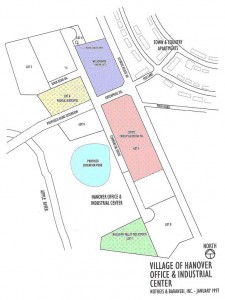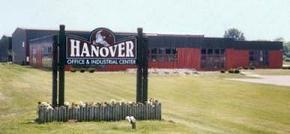Enterprise Zone
 The Hanover Enterprise Zone encompasses the entire corporate limits of Hanover. It offers incentives for economic growth through property and sales tax abatements and other benefits. On March 9, 1993, the Hanover Enterprise Zone was authorized as an extension of the previously established Freeport Enterprise Zone. As such, the Hanover Enterprise Zone is administered by the City of Freeport. The Enterprise Zone is in effect for a period of 20 years, dating from the initial authorization of the Freeport Zone, which was enacted by ordinance December 18, 1989. Therefore, the Hanover Enterprise may operate until December of 2009.
The Hanover Enterprise Zone encompasses the entire corporate limits of Hanover. It offers incentives for economic growth through property and sales tax abatements and other benefits. On March 9, 1993, the Hanover Enterprise Zone was authorized as an extension of the previously established Freeport Enterprise Zone. As such, the Hanover Enterprise Zone is administered by the City of Freeport. The Enterprise Zone is in effect for a period of 20 years, dating from the initial authorization of the Freeport Zone, which was enacted by ordinance December 18, 1989. Therefore, the Hanover Enterprise may operate until December of 2009.
The Hanover Enterprise Zone targets about 100 acres in the southeastern sector of the Village for industrial development. The initial intent of the Enterprise Zone is to enable the Village of Hanover to retain the appliance controls plant, currently owned by Invensys. It is also intended to “promote the renovation and revitalization of the existing business/commercial establishments in the (business) district and encourage development of a broader base of retail outlets and professional/trade services.” Moreover, the Enterprise Zone offers incentives “for improvement to existing housing.”
Enterprise Zone Information:
Enacted in December 2009 and expires December 2013: File for sales tax exemption on material purchased within the State of Illinois. To apply for sales tax exemption, there is a cost of no less than $25.00 (if total project cost is less than $10,000), OR 1/4 of 1% of total project cost if over $10,000.
A complete list of “Potential Purposes” for the Enterprise Zone includes the following:
- Retain the controls plant.
- Retain jobs in the area and improve the quality, skill level, and income of existing employment opportunities.
- Stimulate development of new employment opportunities in number, quantity, skill level and income.
- Stabilize and enhance community population profile in numbers, skills, diversity, income, and overall standard of living.
- Foster neighborhood revitalization and housing rehabilitation.
- Facilitate the development of new housing.
- Provide assistance and encouragement to the development of child-care and day-care alternatives within the community.
- Promote Main Street (i.e., downtown, central business district investment and development).
- Encourage investment in existing plant facilities and local businesses to nurture growth, enhance competitiveness, improve employment, foster profitability and reinvestment, and broaden the range of goods and services offered within the community.
- Maintain and improve community stability and prosperity through economic diversity (i.e., attract new businesses in manufacturing and industry, commerce and retail, and in the trades, professions, and service sector).
- Cultivate and promote agribusiness development.
- Further the growth in recreation-related and tourism-oriented businesses.
- Develop local infrastructure improvements (e.g., new post office, industrial park development, improved access to utilities, services, and transportation).
The Enterprise Zone is a powerful tool for stimulating new development and revitalization. It offers a wide array of incentives otherwise not available to communities.
Following is a complete listing of the incentives available to qualifying projects within the Enterprise Zone:
For industrial property:
- 100% property tax abatement for the value of improvements for 5 years, and 50% of the value of improvements for up to 4 additional years in some cases.
For commercial property:
- 100% property tax abatement for the value of improvements for 3 years.
For residential property:
- 100% property tax abatement for the value of improvements for 3 years.
A waiver of sales taxes on building materials used for remodeling, expansion, or new construction within the Enterprise Zone, if the materials are purchased within the Zone.
Waiver of real estate transfer taxes.
Waiver of building and zoning permit fees for rehabilitation, expansion, or new construction within the Zone (does not apply to repair).
Urban “shopsteading” and “homesteading” programs.
For additional information on the Enterprise Zone, consult the Enterprise Zone application on file at the Village Hall. A review of records maintained by both the Village of Hanover and the City of Freeport illustrates that, since its inception in 1993 through 1997, the Hanover Enterprise Zone had substantial success. Village records show that a total of 36 applications were filed for sales tax abatements, on a total of $719,175 in value of improvements or new construction. Of this $209,000, or 29%, of the value was for industrial projects, $78,900, or 11%, was for commercial projects, and $431,275, or 60%, was for new homes or residential improvements. Data from the City of Freeport show that the total project value of the industrial or commercial projects was $590,000. These projects resulted in the creation of 33 new jobs and retention of 3 jobs.
Additional Resources:
Illinois Department of Commerce and Economic Opportunity (formerly DCCA)
Jo-Carroll Local Redevelopment Authority
Office and Industrial Growth
 Residents clearly and overwhelmingly have cited a need for good jobs as the number one priority for the community. The Village has taken a proactive position regarding job creation. In 1992, the Village of Hanover purchased 27 acres of land on the southeast edge of the village along Route 84 for development. This area will remain undeveloped with the exception of a retention pond for the center’s stormwater runoff. Undeveloped portions of the park are owned by the Village. The Park is served by Illinois Route 84, the Great River Road. Water, sewer, power and gas utilities are in place in a portion of the park.
Residents clearly and overwhelmingly have cited a need for good jobs as the number one priority for the community. The Village has taken a proactive position regarding job creation. In 1992, the Village of Hanover purchased 27 acres of land on the southeast edge of the village along Route 84 for development. This area will remain undeveloped with the exception of a retention pond for the center’s stormwater runoff. Undeveloped portions of the park are owned by the Village. The Park is served by Illinois Route 84, the Great River Road. Water, sewer, power and gas utilities are in place in a portion of the park.
The Village’s policy has been to negotiate directly with business owners considering locating in the center. Because the Village owns the land, it is able to be selective about the size and nature of the businesses it wants on the property. Named the Hanover Office & Industrial Center, the site has proven to be very popular, and is developing rapidly.
Zoning Class: Industrial or Commercial
Jo Daviess County Highway Dept., Jo Daviess County Zoning, and Jo Daviess County Animal Control are located at 1 Commercial Drive.
Peter Boden owns/occupies the building at 6 Commercial Drive (old medical clinic).
K – D Welding is located on Riverview Drive, and employs 7 people.
Mississippi Valley Tree Experts is located at 107 Commercial Drive and employs 4-5 people.
Elizabeth Tire & Body Shop is located on Enterprise Drive and employs 4 people.
There is one lot available on the back southwest corner of the Industrial Park…contact Village Hall for info.
The following table gives basic information on the Center:
| Electricity | 69,000 p.v.; 3-phase |
| Water | 6″ main; 57 p. s. i. |
| Gas | 2″ line; 25 p.s.i. |
| Sewer | 8″ main |
| Zoning Classification | none |
| Fire Insurance Class | 7 |
| Property Tax Abatement | available |
– Adapted from the 1997 “Comprehensive Plan,” Notheis & Baranski, Inc.
Upcoming Events
| Mon | Tue | Wed | Thu | Fri | Sat | Sun |
|---|---|---|---|---|---|---|
| 1 | 2 | 3 | 4 | 5 | 6 | 7 |
| 8 | 9 | 10 | 11 | 12 | 13 | 14 |
| 15 | 16 | 17 | 18 | 19 | 20 | 21 |
| 22 | 23 | 24 | 25 | 26 | 27 | 28 |
| 29 | 30 | |||||

